
BIX ARTICLE
Investor Sentiment and Demand for Bonds and Sukuk in Malaysia
Apr 04, 2025
|
9 min read
Featured Posts
Social Bonds Illustrative Use-Of-Proceeds Case Studies Coronavirus
Jul 06, 2020
|
2 min read
Sustainable Banking Network (SBN) Creating Green Bond Markets
Jul 06, 2020
|
2 min read
Why is Inflation Making a Big Comeback After Being Absent for Decades in the U.S.?
Mar 24, 2022
|
7 min read
SC issues Corporate Governance Strategic Priorities 2021-2023
Mar 29, 2022
|
3 min read

Malaysia's bond and sukuk markets are among the largest and developed in Asia, widely regarded as a global leader in Islamic finance. Being at the forefront of Islamic finance, Malaysia has developed into a vital hub for sukuk following Shariah law, alongside conventional bonds. Investor sentiment and demand for these instruments are influenced by a range of factors, including economic conditions, regulatory frameworks, and global trends. This article discusses the key drivers of investor sentiment and demand for bonds and sukuk in Malaysia, along with the outlook for these markets.
1. Economic Conditions and Interest Rates
One of the primary factors influencing investor sentiment in Malaysia’s bond and sukuk markets is the country’s economic environment. Interest rates, in particular, play a critical role in shaping demand. When market interest rates decline, newly issued bonds typically offer lower coupon rates. As a result, existing bonds with higher fixed coupon rates (issued when interest rates were higher) become more attractive to investors seeking greater yield, often trading at a premium in the secondary market. Since bond prices move inversely to interest rates, existing bonds with higher fixed coupon rates gain value in a declining-rate environment, providing capital appreciation potential. Sukuk, which are Shariah-compliant assets, also attract investors—including those outside Islamic finance—due to their steady income streams and lower volatility compared to equities. Additionally, institutional investors, such as pension funds and insurance companies, increase their allocations to fixed-income securities like bonds and sukuk to meet long-term obligations in a low-yield environment. However, prolonged low rates may lead to reinvestment risk, where investors struggle to find similarly attractive returns when their bonds mature. Overall, in a low-interest-rate climate, bonds and sukuk serve as a preferred haven for stability-seeking investors.
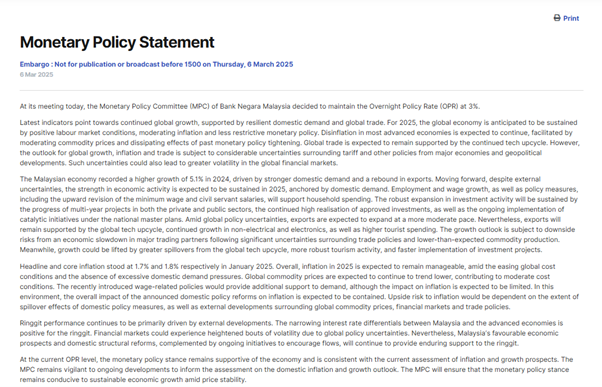.png)
In recent years, Bank Negara Malaysia (BNM) has adopted a broadly accommodative monetary policy stance aimed at stimulating economic activity and fostering recovery. By maintaining interest rates at historically low levels during 2020–2021 (BNM’s OPR at 1.75%—the lowest since 2004), Bank Negara Malaysia (BNM) stimulated borrowing and investment activity. This policy also increased demand for fixed-income instruments like bonds and sukuk, as investors sought higher yields amid depressed returns on deposits and other low-risk assets. This policy environment has supported robust activity in Malaysia's debt capital markets, with both conventional bonds and Shariah-compliant sukuk seeing strong demand from domestic and international investors looking for stable returns in a low-yield global landscape. However, this favorable market dynamic remains sensitive to potential shifts in monetary policy - any future rate hikes or tightening measures by BNM could alter the risk-reward calculus for fixed-income investors, potentially affecting issuance volumes and market liquidity. The sustainability of current market conditions therefore depends heavily on BNM's continued balancing act between supporting growth and maintaining financial stability, particularly in light of global macroeconomic uncertainties and inflationary pressures.
2. Malaysia’s Strong Regulatory Framework
Malaysia’s robust regulatory framework has been a key factor in attracting both domestic and international investors to its bond and sukuk markets. The Securities Commission Malaysia (SC) and BNM have implemented policies that promote transparency, stability, and innovation in the market. For example, the introduction of green sukuk and sustainable bonds has opened new opportunities for investors looking to align their portfolios with environmental, social, and governance (ESG) principles.
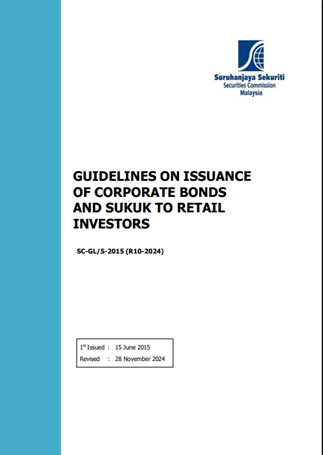
On 28 November 2024, the Securities Commission Malaysia (SC) released revised guidelines under the Guidelines on Issuance of Corporate Bonds and Sukuk to Retail Investors, outlining updated regulatory frameworks for retail participation in bond and sukuk offerings. These revisions aim to enhance investor accessibility while ensuring robust safeguards in Malaysia’s fixed-income market. The complete document, detailing issuance requirements, disclosure standards, and investor protection measures, is available for reference on the SC’s official website. Stakeholders, including issuers and investors, are encouraged to review the guidelines to ensure compliance with the latest standards.
The regulatory support for Islamic finance has also been a major driver of demand for sukuk. Malaysia’s comprehensive legal and regulatory infrastructure for Islamic finance ensures that sukuk issuances are shariah-compliant, providing confidence to investors. This has made Malaysia a preferred destination for issuers and investors alike.
3. Diversification and Risk Management
Bonds and sukuk are often seen as essential components of a diversified investment portfolio. In Malaysia, institutional investors such as pension funds, insurance companies, and asset managers are significant players in the bond and sukuk markets. These investors value the stability and predictable returns offered by these instruments, especially during periods of market volatility.
For retail investors, the Malaysian government has introduced initiatives to make bonds and sukuk more accessible. For example, introduction of seasoned bonds and sukuk allows individual investors to participate in the market with lower investment thresholds. This has helped to broaden the investor base and increase demand for these instruments. For retail investors, eligible distributors for bond and sukuk can be access thru BIX Malaysia website here.
4. Global Trends and Foreign Investor Participation
Malaysia’s bond and sukuk markets are not only driven by domestic factors but also by global trends. As one of the leading sukuk issuer, Malaysia has attracted significant interest from international investors, particularly from the Middle East and other Islamic finance markets. The global shift towards sustainable finance has also boosted demand for Malaysia’s green sukuk and ESG-compliant bonds.
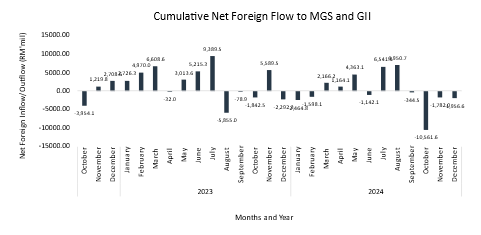
However, global economic uncertainties, such as geopolitical tensions and fluctuations in commodity prices, can impact foreign investor sentiment. For instance, during periods of global economic instability, foreign investors may reduce their exposure to emerging markets like Malaysia, leading to a temporary decline in demand for bonds and sukuk.
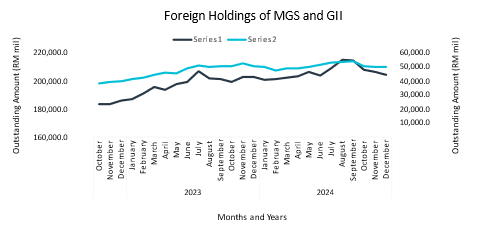
5. The Appeal of Sukuk in Malaysia
Sukuk, in particular, has gained significant traction in Malaysia due to its unique features and alignment with Islamic principles. Unlike conventional bonds, sukuk represent ownership in an underlying asset and provide returns based on profit-sharing rather than interest. This structure appeals to both Islamic and conventional investors seeking ethical and socially responsible investment opportunities.
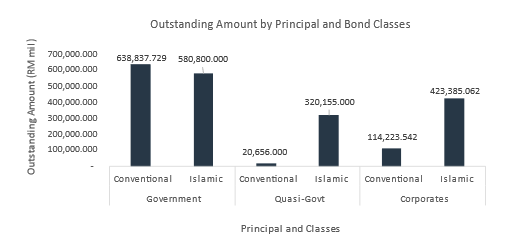
Malaysia’s innovative approach to sukuk issuance, including the development of hybrid sukuk and digital sukuk, has further enhanced its appeal. Hybrid sukuk is a type of sukuk structure in which the underlying pool of assets consists of two or more Islamic finance contracts. These structures are suitable for sukuk token or digital tokens as they are for traditional sukuk which in fact enhances it with standardisation, efficiency, and transparency through the use of blockchain, depending on the particular needs of an institution. In 2020, Malaysia first digital sukuk was issued named Sukuk Prihatin which was launched as a call for national solidarity to support the Government’s recovery effort and each other by funding targeted economic relief measures. The Sukuk offering was performed digitally using BNM existing banking channels for transfers via JomPAY and DuitNow, accessible across twenty-seven banking platforms in Malaysia. The country’s ability to continuously innovate and adapt to market needs has solidified its position as a global leader in the sukuk market.
6. Challenges and Opportunities
Despite the strong demand for bonds and sukuk in Malaysia, there are challenges that could impact investor sentiment. These include:
Market Volatility: Fluctuations in global financial markets can lead to increased volatility in bond and sukuk prices.
Liquidity Concerns: While the Malaysian market is relatively liquid, there are concerns about secondary market liquidity for certain types of bonds and sukuk.
Competition from Other Markets: As other countries develop their Islamic finance capabilities, Malaysia faces increasing competition in attracting investors.
However, these challenges also present opportunities for growth. For example, the adoption of digital technologies, such as blockchain, could enhance transparency and efficiency in the bond and sukuk markets. Additionally, the growing focus on sustainability provides an opportunity for Malaysia to further expand its green and sustainable finance offerings.
Conclusion
Investor sentiment and demand for bonds and sukuk in Malaysia are shaped by a combination of domestic and global factors. The country’s strong regulatory framework, innovative approach to Islamic finance, and focus on sustainability have made it a preferred destination for investors. While challenges remain, Malaysia’s bond and sukuk markets are well-positioned for continued growth, driven by both domestic and international demand.
As Malaysia continues to innovate and adapt to changing market dynamics, its bond and sukuk markets are likely to remain a cornerstone of the global financial landscape. For investors, these instruments offer a unique opportunity to participate in one of the world’s most dynamic and resilient markets.
Disclaimer
This report has been prepared and issued by Bond and Sukuk Information Platform Sdn Bhd (“the Company”). The information provided in this report is of a general nature and has been prepared for information purposes only. It is not intended to constitute research or as advice for any investor. The information in this report is not and should not be construed or considered as an offer, recommendation or solicitation for investments. Investors are advised to make their own independent evaluation of the information contained in this report, consider their own individual investment objectives, financial situation and particular needs and should seek appropriate personalised financial advice from a qualified professional to suit individual circumstances and risk profile.
The information contained in this report is prepared from data believed to be correct and reliable at the time of issuance of this report. While every effort is made to ensure the information is up-to-date and correct, the Company does not make any guarantee, representation or warranty, express or implied, as to the adequacy, accuracy, completeness, reliability or fairness of any such information contained in this report and accordingly, neither the Company nor any of its affiliates nor its related persons shall not be liable in any manner whatsoever for any consequences (including but not limited to any direct, indirect or consequential losses, loss of profits and damages) of any reliance thereon or usage thereof.
YOU MAY ALSO LIKE
ARTICLE
Feb 04, 2026
|
4 min read
ARTICLE
Jan 30, 2026
|
6 min read
ARTICLE
Dec 01, 2025
|
4 min read
ARTICLE
Nov 04, 2025
|
4 min read


